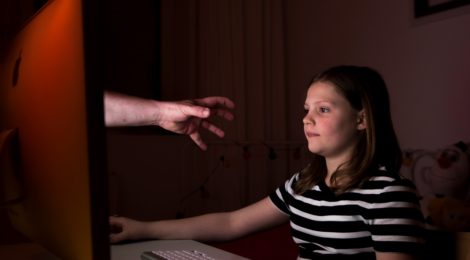
Protecting Children from Online Sexual Exploitation During COVID-19
Children all over the world are victims of online sexual exploitation, and over 200 million children worldwide are victims of sexual abuse. As a result of the COVID-19 pandemic, online usage has increased dramatically for children. The FBI currently has an alert warning about the increased risk of online child exploitation.
People like Justin Payne have taken protecting children into their own hands. A self-described vigilante pedophile hunter, also known as a creep catcher, Payne exposes people who attempt to ensnare children online. He sets up a fake profile of a 12-year old child named Christopher, and when he is solicited by an adult, he agrees to meet with the predator in a public place. After confronting them about their intentions to meet an underage child for sexual purposes, he posts a video of the confrontation online, exposing and publicly shaming them.
Payne agreed to share his story with the Trauma and Mental Health Report (TMHR):
“I made a fake profile one night just to see what would happen, and the person showed right up at the door of the apartment I was living in. I didn’t realize how it would affect me until I actually went over to talk to him. It was intense. Then I did it again. I met another individual in a bar who lived across the street. He had an eight or nine-year-old at home and a wife, he showed up in a family SUV. Again, it’s just like the first couple of times you don’t know what you’ve unleashed until you keep doing it. But then eventually you just become callous; hardened to it. I just feel that at this point now, it’s kind of like a duty.”

Parents concerned about their children’s safety have access to online resources. Bark is an online service that uses artificial intelligence and algorithms to monitor a child’s email, text messaging, and social media. It reports on suspicious activity such as cyber bullying, potential drug use, online predators, depression, acts of violence, and suicide. Using this information, Bark alerts caregivers and provides them with a plan of action to protect their child. During quarantine, they have seen a rise in online predators and their referrals to law enforcement have risen by 23%.
The ‘Chief Parent Officer’ at Bark, Titania Jordan, spoke with the TMHR about why this has occurred:
“We attribute this jump to children being at home and on their devices upwards of 8 hours/day since shelter in place began in mid-March. The reality is that kids can be abused online, even when they’re just in the next room. Kids can be subjected to graphic sexual content, overt manipulation, and sometimes even violent threats from people who are trying to intimidate them into doing what they say”.

Depending on their age, a child’s knowledge surrounding sexuality and sexual abuse can vary. When faced with online predators, children can feel excited about receiving attention or feel a sense of validation about their beauty. If they are lonely, they may also want to feel loved. However, children may also experience shame, embarrassment, or guilt during grooming. The emotions they experience can depend on their age, maturity, mental health, and personal dynamics.
Jordan advises parents and caregivers:
“When your child comes to you with any sort of issue you can choose how to react to it. You can freak out…you can punish them. Those actions will signal “okay, I’m never talking to my parents about this again.” Or, you can remain calm, you can thank them for trusting you and you can navigate the situation together, by not punishing them but by supporting them. It’s your job as a parent to keep them safe, not only in real life with seat belts and helmets, but also online with monitoring solutions.”
-Eleni Neofytou, Contributing Writer
Image Credits:
Feature: Tech. Sgt. Benjamin Wilson at U.S. Air Force photo, Public Domain
First: Werner Moser at Pixabay, Creative Commons
Second: Gaelle Marcel at Unsplash, Creative Commons



